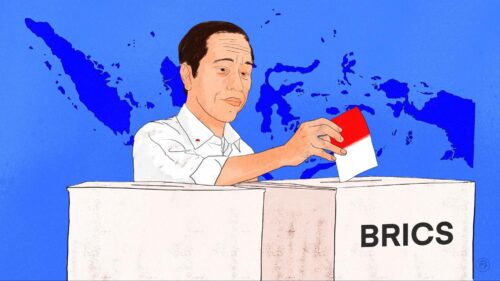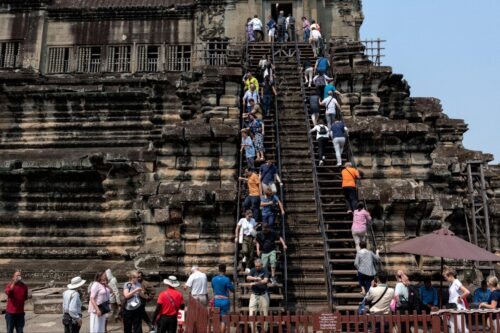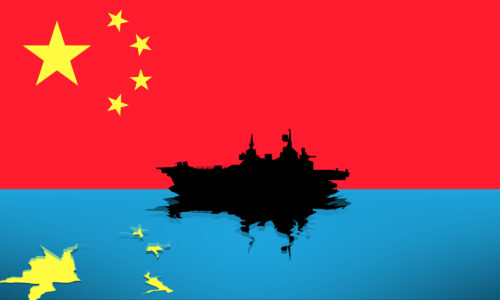Xi welcomes Hun Sen, China’s man in Southeast Asia
Hun Sen went to Beijing for a weekend schmoozefest with Xi Jinping. Now back home, Cambodia's prime minister is using political capital from the visit to undermine civil society.

Chinese leader Xí Jìnpíng 习近平 was all smiles as he received Cambodian prime minister Hun Sen at China’s state guesthouse over the weekend, and he recalled his visitor being the first foreign leader to come to China at the beginning of the pandemic, when much of the world had cut off direct flights.
“Three years ago, Mr. Prime Minister visited China, defying headwinds to offer timely help and support,” Xi said with an uncharacteristically big smile, and even a laugh, as Hun Sen grinned appreciatively. “Your act of kindness aroused a strong response in China, also reflecting our ironclad ties.”
Those ties are now closer than ever, for both Hun Sen and Xi. As Western media and much of the American political class focused on spy balloons, Beijing further consolidated its political, economic, and military presence in the centrally-located Southeast Asian country with a population of around 17 million. Both leaders used the trip to boost a bilateral relationship that has major regional repercussions, now and going forward.
Hun Sen’s three-day trip that ended Saturday was a genuine win-win meeting for both him and Xi — but not necessarily for the average Cambodian. Upon his return to Phnom Penh, it appeared that Hun Sen, Asia’s longest-ruling leader, felt his hand had been strengthened by his trip. On his first full day home today, he ordered the shutdown of Voice of Democracy, a bilingual Khmer-English radio station and website in Cambodia that is among the last of the major independent outlets there.
A patron and a client
Hun Sen’s wins were clear. He received strong political support from Cambodia’s biggest investor as the kingdom heads into an election year, was promised more public and private investment from China that he can trumpet to his domestic audience, and, perhaps most importantly, strengthened military ties with the People’s Liberation Army. Meanwhile, he helped smooth the question of his succession, bringing his son and heir apparent, lieutenant-general Hun Manet, to Beijing to meet Xi for the second time, and sit down with his PLA counterpart.
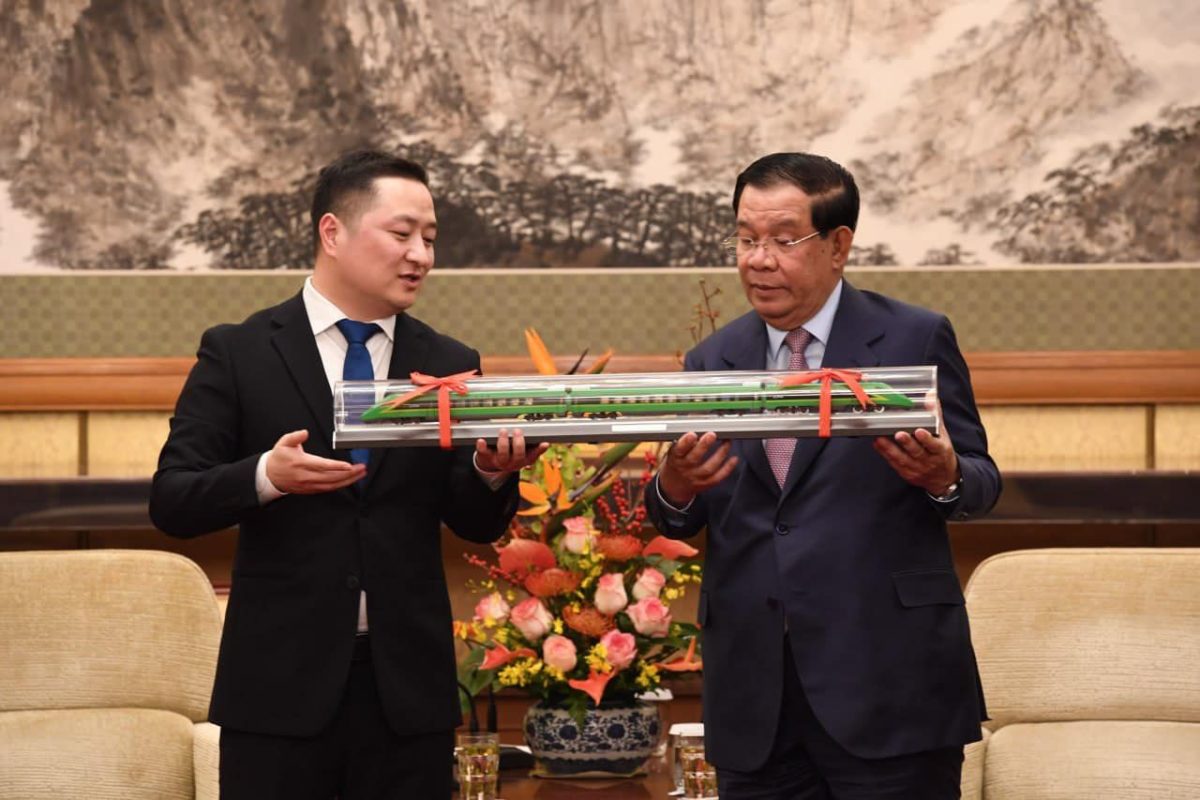
For Xi and the Chinese Communist Party, the Cambodian relationship is perhaps one of its greatest diplomatic investments, in terms of returns. In the past, when he was able to win elections on his own, Hun Sen railed against China — but today he is one of its greatest cheerleaders in the Global South.
Last year Cambodia chaired the Association of Southeast Asian Nations (ASEAN), and for the past decade, the kingdom has reliably blocked ASEAN joint statements critical of Beijing’s militarization of the South China Sea. Cambodia has also been a major boon for Chinese state construction and engineering companies, which have built everything from dams to highways to condo blocks, and even expanded the kingdom’s main naval base, which could be useful in a Taiwan or South China Sea contingency.
“Hun Sen’s relationship with China is one of patron and client — The patron is China, the client is Hun Sen.” said Sophal Ear, associate professor at the Thunderbird School of Global Management at Arizona State University.
While Hun Sen’s visit to Beijing marked three years since his trip at the beginning of the pandemic, as well as the 65th year of PRC-Cambodia diplomatic relations, with the kingdom preparing to hold a general election in July, there are other reasons the timing was ideal for the former Khmer Rouge officer.
Attacks on Cambodian media and political opponents
The order to cancel the operating license for Voice of Democracy echoes moves that Hun Sen made prior to the last election in 2018, when he used accusations of tax avoidance to defang The Phnom Penh Post and Cambodia Daily, while also banning the popular opposition Cambodia National Rescue Party.
“He runs to his patron when it’s time to make sure all the t’s are crossed and i’s dotted,” Ear said of Hun Sen. “He wants to ensure 150% support for anything he does politically to ensure the survival of his regime, which will guarantee China’s investments in Cambodia have a positive return — this means neutralizing all serious opposition.”
His attack on Cambodia’s already-fragile democracy before the last election resulted in criticism from Western capitals. China expressed vocal support for the election, which resulted in Hun Sen’s party, the Cambodia People’s Party, winning all 125 seats, along with his own re-election, which was in serious doubt. Hun Sen thanked China after his party’s win. In 2021, the Trump administration expressed concern that China was building a base for itself at Ream Naval Base, later sanctioning senior Cambodian military officials, then imposing an arms embargo on the kingdom.
In an interview in Phnom Penh with Chinese state broadcaster CGTN prior to his Beijing meetings with Xi, premier Lǐ Kèqiáng 李克强 and Lì Zhànshū 栗战书, National People’s Congress chairman and Xi confidant, the Cambodian prime minister offered unrestrained praise for his hosts, and obliquely criticized the U.S.
“Some countries often threaten and impose sanctions on us, but I am confident that China will never do such a thing to us, so I am not afraid of any pressure,” Hun Sen told his nodding interviewer.
Mu Sochua, the exiled deputy chair of the banned Cambodia National Rescue Party, said Beijing’s support was vital for Hun Sen’s continued political survival. China is not the first patron that Hun Sen has used to assert power. Vietnam was first, installing the Khmer Rouge defector as prime minister in its People’s Republic of Kampuchea in 1985. Vietnam’s backing proved less useful than the United Nations and other international organizations following the UN administration of Cambodia beginning in 1992.
As the UN and aid organizations from democratic countries moved into Cambodia, they pushed respect for democracy and human rights, while trying to keep Hun Sen friendly. Hun Sen’s move towards China began prior to the 2018 election, but the undeniable un-democratic nature of the election finalized the transition to a new patron.
A shared future with no protests allowed?
“China’s political support gave Hun Sen the confidence to secure his position on the ban of Cambodia National Rescue Party as he knew the international community would be less vocal,” Sochua said of her party’s banning in 2017. “Hun Sen is using China’s support as his protection from the West that demands promotion of human rights and free and fair elections. He has been successful in his move as the West fears losing Cambodia to China.”
In addition to absolute power, both Xi and Hun Sen share a fear of uprising against their authority. At the end of last year, protests against China’s pandemic policy morphed into limited calls for the end of Xi’s and even the CCP’s rule. In a joint statement released by Phnom Penh on Saturday, China and Cambodia “emphasized that mutual support on the issues of each other’s core interests is the essence of a Cambodia-China Community with a shared future”, with China declaring “firm opposition to any foreign interference in Cambodia’s internal affairs.”
For its part, the Cambodian side said it “opposes any attempt to interfere in China’s internal affairs or to block and contain China under the subterfuge of Taiwan, or any form of separatist activities seeking ‘Taiwan independence,’ and resolutely supports China’s every effort to achieve national reunification.” (Cambodia is onboard with China’s claim on Taiwan to the point that it has banned all public display of the Republic of China flag used by Taiwan.)
In an ominous sign for civil society in both countries, both China and Cambodia vowed in their statement to fight against “color revolutions.” This does not bode well for the opposition Candlelight Party, which Hun Sen has labeled “extremists” and threatened to ban..
A deluge of Chinese development — and debt
Prior to the pandemic hitting the brakes on Cambodia’s robust economic growth, the kingdom’s economy was heavily reliant on Chinese leisure and business travelers. Phnom Penh is home to NagaWorld, a massive if not world-famous casino complex that in pre-pandemic times was reaping more profits than any of the biggest casinos in Vegas. Powered by Chinese gamblers, the casino is an apt metaphor for today’s Cambodia, with an underground duty-free mall space that is a joint venture with a Chinese state-owned travel company, and the entrance of Cambodia’s central election commission building located inside the casino itself. Nagaworld built the commission’s building.
Today Cambodia is welcoming Chinese tourists back, and the weekend’s meetings are likely to help accelerate the return of moneyed travelers from the PRC, but the foundations for more Chinese travel and investment have been under preparation for years. China has paved highways connecting Phnom Penh with both the port city of Sihanoukville and the tourist hub of Siem Reap, near Angkor Wat. Chinese companies are busy building new airports in both Phnom Penh and Siem Reap, both of which are scheduled for completion by the end of next year. China Railway Group will build a light rail connecting Siem Reap with its new airport, and along with China Road and Bridge Corp and Beijing Urban Construction Group, met with Hun Sen in Beijing to pitch projects and pledge continued investment in Cambodia.
Infrastructure development is improving the ability for Cambodians and visitors to get around the kingdom, but at a cost. China now accounts for more than 40% of Cambodian public debt, but, perhaps because of the kingdom’s importance to Beijing’s regional goals vis-à-vis ASEAN, the South China Sea, and Taiwan, there has been less urgency to get Cambodia to pay up compared with countries further afield in South Asia and Africa.
Describing China’s creditor relationship with Cambodia as a “bear hug”, Arizona State’s Ear said it looked like both Hun Sen and Beijing seem happy with pushing ties closer. Countless completed and ongoing China-built and funded projects dot the kingdom, including highways, bridges, industrial parks, and sewage projects. There are plenty more on the drawing board as well.
“Good governance would require the diversification of this debt,” he said. “Owing too much to anyone will make you very dependent on that country.”
Hun Sen and Chen Zhi’s gold watches
Sochua of the Cambodia National Rescue Party accused Hun Sen of blatant corruption to benefit himself, his family, and trusted insiders – hardly a controversial opinion among many Cambodians.
“We know how Hun Sen is selling Cambodia to China for his own power, and for the sole interests of his family and the one percent of the super rich who benefit from his regime,” she said. Hun Sen’s image as the corrupt leader of a group of elites who are profiting immensely from the kingdom’s China-fueled development wasn’t helped by a 2019 Reuters investigation showing that the prime minister’s family members and close associates had obtained EU passports through a bureaucratic loophole in Cyprus.
Indeed, Hun Sen and those around him regularly flaunt their wealth on social media for all Cambodians to see. His collection of multi-million-dollar luxury watches is as common knowledge as the fact that his most vocal critics end up being murdered under suspicious circumstances. Last November, Hun Sen gifted leaders at an ASEAN summit in Phnom Penh, including Joe Biden with limited-edition luxury watches made in Cambodia.
The gold and jewel-encrusted watches were made by Cambodian technicians working for Prince Horology, which is owned by Chén Zhì 陳誌, a Chinese national who took Cambodian citizenship and heads the Prince Group, a massive property conglomerate with major projects in Phnom Penh, Sihanoukville and elsewhere. Chen, who uses the Khmer title Neak Oknha — similar to a duke — regularly appears in photos with the Cambodian prime minister.
Skyscrapers, residential towers, and massive malls built by Prince Group and other Chinese-invested companies dominate the skylines of Phnom Penh and Sihanoukville. The latter city is quickly being developed into a sequel to Shenzhen. As early as 2019, it was becoming obvious that Sihanoukville had become a key destination for Chinese investors — at that time, the provincial government of Preah Sihanouk, of which Sihanoukville is capital, reported that 90% of companies across the province were Chinese-owned.
While the pandemic battered Cambodia’s tourism sector, it was less damaging to the kingdom’s ongoing integration into global supply chains, which centers around the Sihanoukville Special Economic Zone (SSEZ). The zone, Cambodia’s largest, reported $2.5 billion in trade last year, a 12 percent increase over the previous year.
But Sihanoukville is better known for other things. As Al Jazeera highlighted in a 2022 investigation, crime of all kinds is rampant in Sihanoukville, with online scamming by human trafficking victims at the center of it all. One of the scam centers where nationals from around the region were forced to dupe people around the world into parting with their money for imaginary investments was owned by Chen Zhi’s Prince Group, the report found. More often than not, the scam centers are run by Chinese nationals, and are frequently “staffed” by Chinese forced laborers, who are forced in turn to attempt to steal from unsuspecting Chinese.
The prize: A port for the PLA Navy?
However bad things may be in Sihanoukville — and they are definitely not good — it is of major strategic value to military planners in Beijing. Cambodia’s potential to help the PLA project deeper into Asia has only been making headlines in the U.S. for the past couple of years, but it is not going away. The ongoing construction at nearby Ream Naval Base, which was originally going to be done by American companies, is now a Chinese project. And while both Phnom Penh and Beijing insist that Ream will not become a Chinese base, facts on the ground — or rather, from the sky — suggest that could eventually be presented as a fait accompli, just like China’s militarization of islands in the South China Sea.
Thomas Shugart, an adjunct senior fellow at the Center for a New American Security and a former U.S. Navy submarine warfare officer, has been observing construction at the base using open-source intelligence.
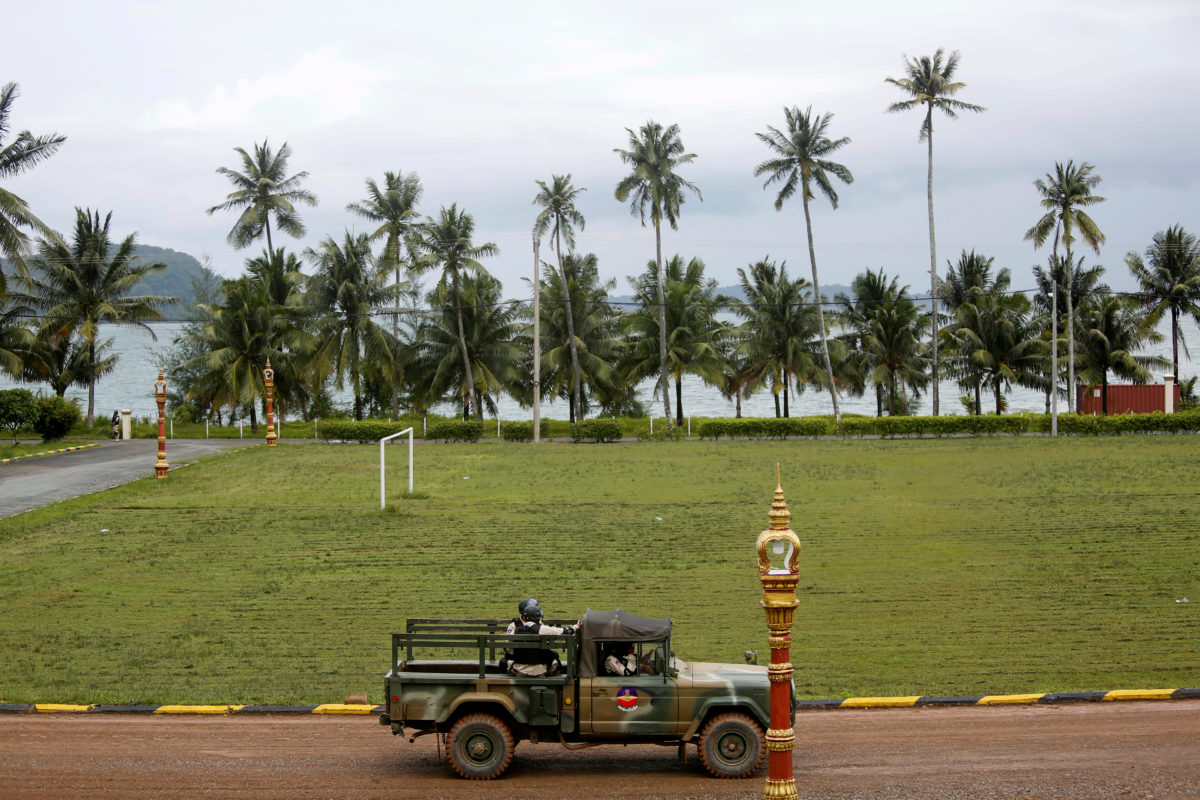
“It seems almost certain to me that most of the new construction on the base will be for PLA use,” Shugart said. “In commercial imagery, we can see signs of dredging and construction of the larger, deep draft pier facilities that have been reported in the press as part of the plan and agreement” that the U.S. government alleges exists between Cambodia and China.
“Since the Cambodian Navy doesn’t operate any warships that would require such a pier, it seems quite likely to me that those deep draft facilities are being built for PLA Navy warships, or I suppose whoever else might visit,” he added.
A PLA Navy operational presence in Sihanoukville would instantly boost China’s ability to project force into continental and maritime Southeast Asia, where Chinese territorial claims in the South China Sea overlap with those of Malaysia, Vietnam, Brunei, the Philippines and Taiwan. In the case of a Taiwan contingency, the base would also likely come into play, as might an airport in sleepy Koh Kong province, also in Cambodia’s south.
In 2008 the Chinese company Tianjin Union Development Group signed a 99-year lease of 45,000 hectares in the province for a residential, commercial and tourist development – the Dara Sakor economic zone. Observers in the US military and elsewhere have noted with concern that the airport that the Chinese company has built features an airstrip that significantly exceeds the length requirement for commercial jetliners, but meets those of Chinese bombers.
How much is too much for ordinary Cambodians?
Ties between Cambodia and China are ultimately based on human relationships, which is where Hun Manet’s value becomes clear to Beijing. Not only is he Hun Sen’s son and designated successor, he has now met Xi Jinping twice, which should discourage any potential domestic challengers. Hun Manet is deputy commander-in-chief of the Royal Cambodia Armed Forces and commander of the Royal Cambodian Army — this weekend he met with Zhāng Yòuxiá 张又侠, vice chairman of China’s Central Military Commission. The West Point graduate’s presence in Beijing alongside his father likely provided Xi and company with reassurance on both the political and military levels.
For Cambodians who prefer democracy to dynastic politics, Hun Manet’s inclusion in the delegation sent a clear message, said Cambodia National Rescue Party’s Sochua.
“Each move made by Hun Sen to pave the way for his son to be his successor is calculated and obvious,” she said. “The visit was to say to China: my son will serve you.”
For Ear of Arizona State, a major question regarding China-Cambodia ties is how much will be too much for the average Cambodian, especially given the precarious existence of yet another opposition party.
“Cambodians are not stupid,” Ear said. “They know right from wrong, and when their country is rotten. They had a taste of democracy, human rights, and freedom. That taste doesn’t go away just because the opposition party has been dissolved.”

